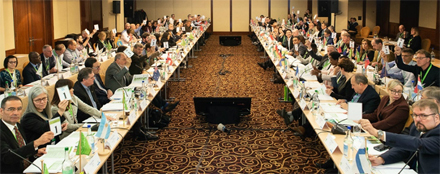 “What is the value PEFC as a sustainability organisation can deliver – beyond certification?” asked Ben Gunneberg, PEFC International CEO and Secretary General, during his reflections at the 23rd PEFC General Assembly in Geneva, Switzerland. “Currently, around 10% of forests are certified globally, and our current approach is certainly suitable to more than double this number, but we now need to start addressing the needs of the remaining 80% of global forestry to ensure it too becomes sustainable and is key in addressing societal challenges such as climate change.” Source: Timberbiz
“What is the value PEFC as a sustainability organisation can deliver – beyond certification?” asked Ben Gunneberg, PEFC International CEO and Secretary General, during his reflections at the 23rd PEFC General Assembly in Geneva, Switzerland. “Currently, around 10% of forests are certified globally, and our current approach is certainly suitable to more than double this number, but we now need to start addressing the needs of the remaining 80% of global forestry to ensure it too becomes sustainable and is key in addressing societal challenges such as climate change.” Source: Timberbiz
“Sustainable forest management goes beyond safeguarding forest as an ecosystem. It is also about securing sustainable livelihoods for the hundreds of millions of people living, working and depending on forests,” he said.
“It is also about rural communities, about indigenous people, about small, family run enterprises, providing countless jobs far away from cities.
“It is about all of us truly valuing the numerous benefits forests provide us with.
“But how can we do this?”
“We need to be innovative and adaptable to change, to work together in local, national and international partnerships, and to communicate better the benefits of the full value chain from forests, through processors, retails all the way to the final consumer, as outlined in our new strategy,” Mr Gunneberg said.
“If we look at soft commodity sustainability certification systems in general, there is a global move away from one-size fits all to a more tailored approached to certification. PEFC has pioneered tailored approaches, we have been working through nationally developed, owned and implemented forest certification systems for almost 20 years, and we gladly share our experiences and lessons learnt.”
“Discussions among thought leaders in sustainability certification focus on ways and means as to how we can move towards a more cost effective, risk based approach providing measurable impacts such as the jurisdictional and territorial approach to certification. PEFC has been delivering this since our early beginnings through our regional and group based certification mechanisms. Group certification has enabled more than one million smallholders globally to achieve PEFC certification to date, and we need to be pro-active in our communications effectiveness to enable others to benefit from our knowledge.
“We need to learn as well, we need to enhance our focus on demonstrating impacts, we need to better equip ourselves to take advantage of available data and information in order to increase our own efficiency to ensure that we add real lasting value – not only to those who obtain certification, but to society as a whole.
“We are the forest certification system of choice for smallholders worldwide. Our success is based on our ability to provide workable solutions for everyone. This success comes with a responsibility: we need to further increase our offering and the value that we can provide, beyond those who depend on their forests and trees as their main – and often only – source of income. We need to consider how we can positively impact the lives of the estimated 500 million farmers who manage trees.
“These include numerous smallholders, as 85% of the world’s farms land are less than two hectares in size. Many are managed by women – and they feed most of the world’s population. Our new Trees outside Forests certification module approved today as part of our enhanced and revised sustainable forest management standard, is definitely a step in the right direction.
“It’s not the strongest of the species that survives, nor the most intelligent, but the ones most adaptable to change,” Mr Gunneberg quoted Leon Megginson’s reference to the works of Charles Darwin stating, stressing that “to face these challenges together, as the PEFC alliance, we must continue to be a learning organisation, open to change and ready to adapt – moving forward together.”





